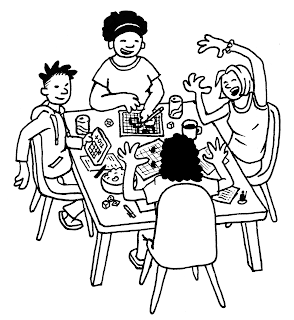Mix your campaign up with a worldbuilding session
 |
| Illustration by Emiel Boven under CC BY 4.0 |
After playing Exquisite Biome by Caro Asercion, I had the feeling its overall approach to worldbuilding would work very well for all sorts of situations. So I jotted down a more generalised game on the back of an envelope. Soon, I got the chance to apply it.
My Mothership players brought back new genetic materials, and they wanted to bioengineer them into solutions for their luxury ship. At the moment, it was being forced to survive indefinitely in deep space, which it wasn't built to do at all. I thought it would be fun to just do a worldbuilding game for a session, in which the players think of how the ship changes over a span of decades, as its crew uses their available means to adapt to deep space survival.
It was a great session, so I've written the steps down, with some wording adapted from Microscope by Ben Robbins. We'll set up a big picture, the type of things we will focus on, lenses through which to inspect each focus, prompts to inspire what we see, and scenes to observe each focus in motion on its own as well as together. That's the things to keep in bind; big picture > focus > lens > prompt > scene
Worldbuilding steps
1. What's the big picture? What kind of stuff will you focus on? What are the player characters doing?
- Exquisite biome: Observing wildlife in an alien ecosystem.
- Our game: Ship's crew developing bioengineered upgrades for a spaceship in trouble.
- Exquisite Biome: 1; a general description, 2; a distinctive feature, 3; habits and personality.
- Our game: 1; a deep-space survival problem, 2; existing expertise on-board, 3; a new bioengineering feat.
- Exquisite biome: prompts are already provided for each lens specifically, as well as for the ecosystem as a whole.
- Our game: We wrote each prompt on an index card you could stack and draw, like mushroom farms, solar sails, a brain hivemind, and zero-gravity basketball (don't ask).
- Exquisite biome: you draw cards to determine each prompt.
- Our game: players were eager to put eachothers' prompts into practice. Mushroom farms sounded like a new bioengineering feat, but could also be used as a problem; the soil is getting exhausted and our farms are getting worse and worse yields!
- Exquisite biome: feels like you're David Attenborough.
- Our game: players got their characters mixed up in the engineering in dramatic ways.
- Exquisite biome: an alien ecosystem has been created, begging to be explored further.
- Our game: a new solarpunk ship was created with deeply troubling developments that kept us busy for many sessions to come.
 |
| Illustration by Emiel Boven under CC BY 4.0 |
%20(1).png)

.png)
Comments
Post a Comment